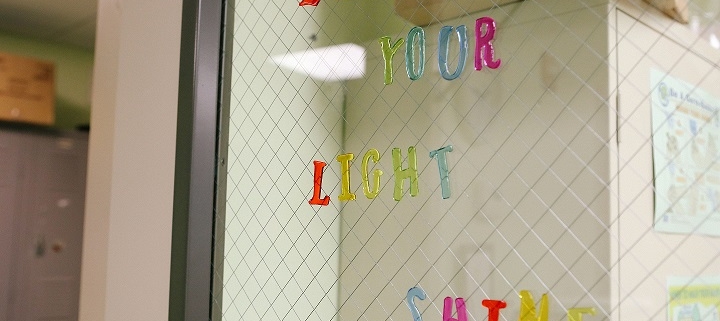How to Talk to Your Kids About Coronavirus
The global pandemic is all over the news, social media, and the tips of the tongue these days. It’s impossible to escape. For young children, the idea of a virus sweeping the world can be an overwhelming, anxiety-provoking topic. They may worry about catching it themselves and dying, or about its impact on friends and family. They might feel sad or confused about school closing.
As a parent, it’s natural to want to shelter our children from the unpleasantries of life. We don’t want them to panic or take on adult concerns as their own. However, protecting kids from the news headlines doesn’t do them any favors.
As Mister Rogers once said, “Anything that’s human is mentionable, and anything that is mentionable can be more manageable. When we can talk about our feelings, they become less overwhelming, less upsetting, and less scary.” By that token, we’re not only helping our children cope with changes in their world, but we’re helping ourselves too.
We’ve compiled the best expert tips for how to talk to your kids about coronavirus…
1. Find out what they know and what concerns they have.
Chances are, your kids have already heard the term “coronavirus” thrown around at school. They might have played a game of tag where they “catch the virus,” rather than tagging “it.” Or the teacher might be a little extra fanatical about handwashing and sanitizing. Some schools may be handing out gloves and masks or showing videos about how viruses spread. Older children may have witnessed xenophobic bullying.
Though they may not fully understand it or know how seriously to take the threat, they are undoubtedly beginning to notice how it affects their daily lives, as schools close and events cancel. Their imaginations may begin to run wild with possibilities.
You might ask an open-ended question such as, “What have you heard about coronavirus?” or “Do you have any questions about coronavirus?” If they’ve brought it up, you might say, “It sounds like you’re worried. Can you tell me what you’re worried about?” Take this opportunity to clear up any misconceptions they have and address anxieties.
2. Stick to the honest facts and then reassure them.
If your kids have no idea what coronavirus is or what its spread through communities means, start with a few simple facts. You might explain, “Virus germs cause different illnesses that spread from person to person. You know, like a cold or the flu or a throwing up sickness? It’s like that, but a little more serious.”
“Coronavirus is a new one that has started to affect people, mainly in other countries, but a few people here. Because we are still working on the medicines to cure it, people are concerned about limiting the spread in our communities. So we’re taking extra steps to stay safe.”
To date, no children under age 10 have died from coronavirus. For ages 10 to 39, the risk of fatal complications is just 0.2 percent. Let your child know, “For most people, the new coronavirus results in only mild or moderate symptoms like a fever and a cough. Most people get better after a few weeks. Older people and people with existing health problems might become sicker with pneumonia.”
Some kids may worry about grandma and grandpa or even mom and dad. To that end, you can simply say, “We are taking good care of ourselves and plan to live a very long time.” Younger kids, in particular, do not need to know all the latest information, as much as they need to be reassured that they are safe and life will continue as normally as possible. If your child has questions about why people are wearing masks, you can explain that government health officials from the CDC say “masks are not necessary for most people,” but these individuals are “choosing to be extra-cautious.”
It’s okay to let kids know you’re worried. You don’t want to brush off their feelings either. “It’s okay to feel a little scared. When I first heard about it, I was scared too.” Put the fear into context by saying, “But it isn’t much scarier than the things we deal with every day” or “But we’re doing what we can to stay healthy.” Let them know how you’re coping and how they can alleviate some of their stress. “Going outside and playing with the dog helped me feel better,” you might say.
Sometimes it’s easiest to explain with the use of age-appropriate visual aids as a guide. NPR has an awesome comic that explains the basics of coronavirus. BrainPOPhas educational games, activities, and a cartoon illustrating how viruses spread, so kids can understand what’s going on without excessive alarm.
Beware of information overload, but you can keep a pulse on the latest COVID-19 developments with Accuweather’s Daily Briefings, the NY Times website, or the World Health Organization updates.
3. Emphasize healthy hygiene habits and how to stay safe.
“It’s important for kids to understand that they have a role to play in this,” explains Christina Chang, CEO of global health organization Vital Strategies. Kids feel empowered when they have steps they can take to stay safe and prevent germ spread. Chang adds, “This is big and has a lot of unknowns, but there is some element of control. The things that keep you safe and healthy every day are the same habits that are going to keep you healthy through this outbreak.”
Emphasize handwashing hygiene, using soap for at least 20 seconds (during which time they can sing a brief song of their choice), getting in between fingers and under nails, and drying hands thoroughly after rinsing. Hands should be washed upon entering the house, before meals, after a cough or sneeze, after using the bathroom, and after taking public transportation or shopping.
Remind your kids to keep hands out of their eyes, noses, and mouths. Teach them that the skin is a barrier to germs, but these other body parts can act as “doors” or “windows” for germs to get inside, so it’s important that they tell their hands “no” to picking noses, biting nails, and rubbing eyes. Give them alternatives like tissues, chewing necklaces, and eye drops.
Teach proper sneezing technique. Some day cares tell kids to “sneeze into your chicken wing,” which is a funny way of describing the inner bend of the elbow. They laugh and remember it more easily.
The Public Broadcasting Station offers video clips, songs, games, and apps from Daniel Tiger, Sesame Street, Curious George, and Super WHY! that emphasize how to wash hands, sneeze into an elbow, and fight germs through healthy hygiene habits.
4. Take care of your minds and bodies.
Limits placed on social activities can be stressful for small children and yourself.
Take care to get outside every day, even if it’s just for a brief bundled-up, umbrella-carrying, 10-minute walk. The sunshine and fresh air can boost your mental health.
Indoor activities like Go Noodle exercises and Skyping or Facetiming friends can take the edge off the sense of confinement.
Try to make your weekends more fun with family board games, movie nights, or craft projects. Check out Ways To Keep The Kids From Going Stir-Crazy Over Winter Break for ideas.
Spring small group enrichment classes are currently still in session with Shine, so contact us for details.



